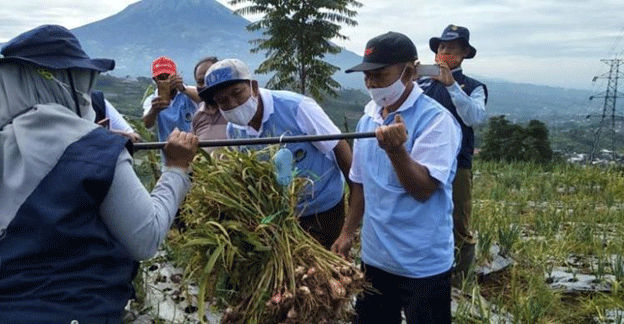On October 27, 2024, Lhokseumawe marked a significant achievement with the first large-scale harvest of red onions in Gampong Paloh Batee, Muara Satu district. This collaborative effort between the city, Syiah Kuala University, and the Udeep Beusare Farmers Group aims to boost food security by using eco-friendly and sustainable farming practices, made possible with the support of the DIKTI Kedaireka Program.
The program’s success is evident, producing an impressive 9 tons of red onions per hectare on a two-hectare plot in only 65 days. This fast turnaround showcases the potential for Lhokseumawe to become a leading production hub for red onions, reducing dependency on imported onions and stabilizing local food prices.
Sustainability and Innovation Through Collaboration
The Acting Mayor of Lhokseumawe, A. Hanan, SP. MM, expressed enthusiasm for the project’s accomplishments and highlighted the importance of its sustainable practices. “The real achievement here isn’t just in the quantity harvested but in the sustainable techniques employed. Reducing the use of harmful chemicals not only protects the environment but also enhances soil health for future generations,” stated Hanan. He noted that such initiatives align with national objectives to reduce inflation and strengthen the country’s food security by bolstering local food production.
A critical element of this project is the application of sustainable practices, focusing on soil health and reducing chemical usage. The farmers chose resilient varieties like Bauji and Nganjuk, which can endure fluctuations in climate and maintain high yields. These techniques allowed farmers to overcome unpredictable weather, including inconsistent rainfall and extreme temperatures, ensuring a stable harvest despite environmental challenges.
Capacity-Building for Farmers and Long-Term Market Stability
Lhokseumawe’s collaboration with Syiah Kuala University has provided hands-on training to farmers, enabling them to apply climate-resilient farming methods and improve productivity. According to Prof. Dr. Ir. Rina Sriwati, M.Si, head of the Doctor of Agricultural Sciences Program at Syiah Kuala University, “Supporting farmers with sustainable practices and climate-adapted techniques is vital to achieving consistent yields. Selecting weather-resistant varieties and refining cultivation techniques help address climate unpredictability, ensuring resilience for farmers.”
The project’s ultimate goal extends beyond the immediate harvest; it aims to stabilize the red onion market through improved planting schedules and better storage practices. Hanan expressed hope that proper timing and storage could allow onions to be stored for up to six months, helping stabilize prices and reduce market fluctuations, which are often seen with this crop.
A Path to Food Security and Economic Growth
This red onion project holds the potential to establish Lhokseumawe as a significant red onion production center in Aceh, providing a sustainable supply chain for this essential crop. With ongoing support from Syiah Kuala University, local farmers are not only learning valuable skills but are also contributing to economic stability and food security in the region. As this model of sustainable and climate-resilient agriculture develops, it could offer similar benefits to other regions facing agricultural and environmental challenges.
The successful red onion harvest in Lhokseumawe is a testament to the power of sustainable farming practices backed by governmental and academic support. This project highlights the role of collaborative efforts in reducing chemical usage, fostering climate resilience, and stabilizing crop prices. As Lhokseumawe takes its place as a model for eco-friendly agriculture, it sets an inspiring example for other regions seeking to improve food security and economic resilience.































